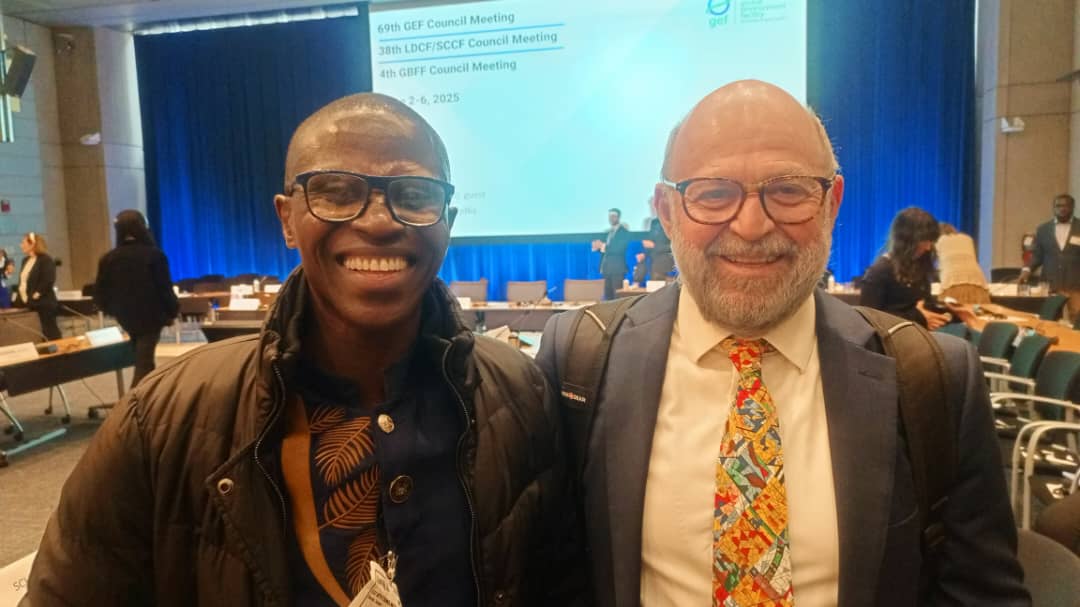Dr. Samuel Dotse champions Climate Action and Financial Mobilisation at 69th GEF Council Meeting in Washington, D.C. USA – Nsemkeka
Global environmental financing is taking center stage this week at the 69th Session of the Global Environment Facility (GEF 69) Council Meeting, where USD$261 million is being allocated to innovative, transformative programs addressing biodiversity conservation, pollution remediation, and locally led environmental actions.
Amid the high-level gathering of environmental leaders and decision-makers, Dr. Samuel Dotse, CEO of HATOF Foundation and Laureate of Distinction in Climate Change, is making strategic waves.
Attending the Council meeting at the invitation of Carlos Manuel Rodriguez, the GEF CEO and Chair of the Secretariat, Dr. Dotse is actively advocating for ambitious climate financing, forging important international partnerships, and elevating Ghana’s visibility within the global environmental financing dialogue.
His presence underscores the importance of inclusive, transparent, and well-financed environmental governance in addressing both national and global environmental challenges.
Beyond the Council floor, Dr. Dotse is officially invited to speak at the Climate Investment Funds (CIF) 2025 Observer Onboarding Workshop at the World Bank Office in Washington, where he will deliver insights on enhancing transparency in the governing bodies of Multilateral Climate Funds and the crucial role observers play in strengthening accountability and institutional transparency.
In a series of high-level bilateral meetings, Dr. Dotse is also engaging with the Adaptation Fund Secretariat, CIF leadership, and Multilateral Accredited Entities and development partners to secure targeted funding for climate resilience, biodiversity conservation, and sustainable land management in Ghana.
Out of the $261 million up for disbursement at the Council, $195 million is earmarked for projects focused on eliminating toxic substances from from cosmetic products and industrial processes, support collaboration across international waterways, and propel a variety of locally led environmental efforts, including through microfinance.
Additionally, the Global Biodiversity Framework Fund (GBFF) is considering $26 million in grants to scale up biodiversity protection efforts and community well-being programs across multiple countries.
Dr. Dotse’s strategic engagement comes at a pivotal time, as the GEF Council reviews progress toward key global environmental goals and aligns funding strategies with the evolving mandates of multilateral environmental conventions.
About the Global Environment Facility (GEF):
The GEF is the world’s largest multilateral fund supporting developing countries, including Ghana in meeting global environmental commitments. It serves as the financial mechanism for several key environmental conventions, including the UN Framework Convention on Climate Change Convention, UN Convention on Biological Diversity, Convention to Combat Desertification, Stockholm Convention on Persistent Organic Pollutants, Minamata Convention on Mercury, and the Biodiversity Beyond National Jurisdiction (BBNJ). The GEF comprises 186 member countries, and its Council—made up of 32 representatives from developed, developing, and transitional economies—meets twice yearly to set policies, review progress, and approve funding for environmental projects.
About the Global Biodiversity Framework Fund (GBFF):
Launched in 2023, the GBFF supports developing nations in implementing the Kunming-Montreal Global Biodiversity Framework with strategic focus on strengthening national-level biodiversity management, planning, policy, governance, and finance approaches. With $202 million already committed across 41 countries, the GBFF aims to drive national-level biodiversity policies and planning to meet the ambitious goal of living in harmony with nature by 2050. Ghana is yet to benefit from the GBFF.

